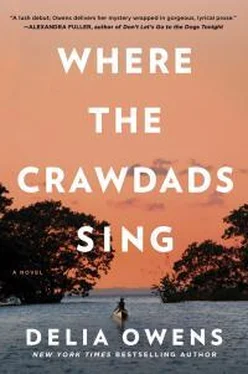Also by Delia Owens
WITH MARK OWENS
Secrets of the Savanna
The Eye of the Elephant
Cry of the Kalahari
G. P. PUTNAM’S SONS
Publishers Since 1838
An imprint of Penguin Random House LLC
375 Hudson Street
New York, New York 10014
Copyright © 2018 by Delia Owens
Penguin supports copyright. Copyright fuels creativity, encourages diverse voices, promotes free speech, and creates a vibrant culture. Thank you for buying an authorized edition of this book and for complying with copyright laws by not reproducing, scanning, or distributing any part of it in any form without permission. You are supporting writers and allowing Penguin to continue to publish books for every reader.
Excerpts from “The Correspondence School Instructor Says Goodbye to His Poetry Students” from Three Books by Galway Kinnell. Copyright © 1993 by Galway Kinnell. Reprinted by permission of Houghton Mifflin Harcourt Publishing Company. All rights reserved.
“Evening” from Above the River: The Complete Poems © 1990 by Anne Wright. Published by Wesleyan University Press. Used by permission.
Library of Congress Cataloging-in-Publication Data
Names: Owens, Delia, author.
Title: Where the crawdads sing / Delia Owens.
Description: New York : G.P. Putnam’s Sons, 2018.
Identifiers: LCCN 2018010775| ISBN 9780735219090 (hardback) | ISBN 9780735219113 (epub)
Subjects: | BISAC: FICTION / Literary. | FICTION / Coming of Age. | FICTION / Contemporary Women.
Classification: LCC PS3615.W447 W48 2018 | DDC 813/.6—dc23
LC record available at https://lccn.loc.gov/2018010775
p. cm.
Map and illustrations by Meighan Cavanaugh
This is a work of fiction. Names, characters, places, and incidents either are the product of the author’s imagination or are used fictitiously, and any resemblance to actual persons, living or dead, businesses, companies, events, or locales is entirely coincidental.
Version_1
To Amanda, Margaret, and Barbara
Here’s to’d ya
If I never see’d ya
I never knowed ya.
I see’d ya
I knowed ya
I loved ya,
Forever.
Contents
Also by Delia Owens
Title Page
Copyright
Dedication
Map
PART 1 | The Marsh
Prologue
1. Ma
2. Jodie
3. Chase
4. School
5. Investigation
6. A Boat and a Boy
7. The Fishing Season
8. Negative Data
9. Jumpin’
10. Just Grass in the Wind
11. Croker Sacks Full
12. Pennies and Grits
13. Feathers
14. Red Fibers
15. The Game
16. Reading
17. Crossing the Threshold
18. White Canoe
19. Something Going On
20. July 4
21. Coop
PART 2 | The Swamp
22. Same Tide
23. The Shell
24. The Fire Tower
25. A Visit from Patti Love
26. The Boat Ashore
27. Out Hog Mountain Road
28. The Shrimper
29. Seaweed
30. The Rips
31. A Book
32. Alibi
33. The Scar
34. Search the Shack
35. The Compass
36. To Trap a Fox
37. Gray Sharks
38. Sunday Justice
39. Chase by Chance
40. Cypress Cove
41. A Small Herd
42. A Cell
43. A Microscope
44. Cell Mate
45. Red Cap
46. King of the World
47. The Expert
48. A Trip
49. Disguises
50. The Journal
51. Waning Moon
52. Three Mountains Motel
53. Missing Link
54. Vice Versa
55. Grass Flowers
56. The Night Heron
57. The Firefly
Acknowledgments
About the Author
PART 1 The Marsh
Prologue
1969
M arsh is not swamp. Marsh is a space of light, where grass grows in water, and water flows into the sky. Slow-moving creeks wander, carrying the orb of the sun with them to the sea, and long-legged birds lift with unexpected grace—as though not built to fly—against the roar of a thousand snow geese.
Then within the marsh, here and there, true swamp crawls into low-lying bogs, hidden in clammy forests. Swamp water is still and dark, having swallowed the light in its muddy throat. Even night crawlers are diurnal in this lair. There are sounds, of course, but compared to the marsh, the swamp is quiet because decomposition is cellular work. Life decays and reeks and returns to the rotted duff; a poignant wallow of death begetting life.
On the morning of October 30, 1969, the body of Chase Andrews lay in the swamp, which would have absorbed it silently, routinely. Hiding it for good. A swamp knows all about death, and doesn’t necessarily define it as tragedy, certainly not a sin. But this morning two boys from the village rode their bikes out to the old fire tower and, from the third switchback, spotted his denim jacket.
1. Ma
1952
The morning burned so August-hot, the marsh’s moist breath hung the oaks and pines with fog. The palmetto patches stood unusually quiet except for the low, slow flap of the heron’s wings lifting from the lagoon. And then, Kya, only six at the time, heard the screen door slap. Standing on the stool, she stopped scrubbing grits from the pot and lowered it into the basin of worn-out suds. No sounds now but her own breathing. Who had left the shack? Not Ma. She never let the door slam.
But when Kya ran to the porch, she saw her mother in a long brown skirt, kick pleats nipping at her ankles, as she walked down the sandy lane in high heels. The stubby-nosed shoes were fake alligator skin. Her only going-out pair. Kya wanted to holler out but knew not to rouse Pa, so opened the door and stood on the brick-’n’-board steps. From there she saw the blue train case Ma carried. Usually, with the confidence of a pup, Kya knew her mother would return with meat wrapped in greasy brown paper or with a chicken, head dangling down. But she never wore the gator heels, never took a case.
Ma always looked back where the foot lane met the road, one arm held high, white palm waving, as she turned onto the track, which wove through bog forests, cattail lagoons, and maybe—if the tide obliged—eventually into town. But today she walked on, unsteady in the ruts. Her tall figure emerged now and then through the holes of the forest until only swatches of white scarf flashed between the leaves. Kya sprinted to the spot she knew would bare the road; surely Ma would wave from there, but she arrived only in time to glimpse the blue case—the color so wrong for the woods—as it disappeared. A heaviness, thick as black-cotton mud, pushed her chest as she returned to the steps to wait.
Kya was the youngest of five, the others much older, though later she couldn’t recall their ages. They lived with Ma and Pa, squeezed together like penned rabbits, in the rough-cut shack, its screened porch staring big-eyed from under the oaks.
Jodie, the brother closest to Kya, but still seven years older, stepped from the house and stood behind her. He had her same dark eyes and black hair; had taught her birdsongs, star names, how to steer the boat through saw grass.
“Ma’ll be back,” he said.
“I dunno. She’s wearin’ her gator shoes.”
“A ma don’t leave her kids. It ain’t in ’em.”
“You told me that fox left her babies.”
“Yeah, but that vixen got ’er leg all tore up. She’d’ve starved to death if she’d tried to feed herself ’n’ her kits. She was better off to leave ’em, heal herself up, then whelp more when she could raise ’em good. Ma ain’t starvin’, she’ll be back.” Jodie wasn’t nearly as sure as he sounded, but said it for Kya.
Читать дальше











